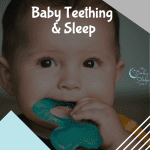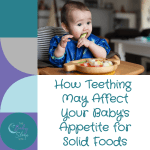 Babies can start teething as early as just a few months old, but it might take a while before the actual tooth even appears. In this blog post, I give you tips on how to handle teething, sleep training, and more, based on my experience as a sleep consultant for 15+ years.
Babies can start teething as early as just a few months old, but it might take a while before the actual tooth even appears. In this blog post, I give you tips on how to handle teething, sleep training, and more, based on my experience as a sleep consultant for 15+ years.
When Does Teething Start?
Teething starts around 6 months old, on average. However, some babies start teething before 4 months old. Other babies won’t cut their first tooth until after 12 months old.
My first son got his first tooth at 5 months old, and his younger brother was 7 months old. My friend’s son, however, got his first tooth after 12 months old!
Symptoms and Signs
Some babies never show any signs of teething apart from drooling and chewing on everything. Others will get fussy and cranky as the tooth is popping through. Here are the common teething symptoms and signs:
- Sore and Swollen Gums
- Mild Fever (100.4 Fahrenheit degrees or below)
- Flushed cheeks or mild rash on their face
- Rubbing ears
- Excessive drooling
- Chewing more than usual
- Extreme fussiness and irritability
- Disrupted sleep and night-waking
Now that you know the symptoms of teething, let’s look at the impact on a baby’s sleep.
You may also be interested in:
Impact on Sleep
Some babies will sleep through all teething episodes while others will have numerous night wakings. Some experts have said it will not disrupt sleep, but I wholeheartedly disagree!
As with everything else, all babies are different and they will all have different pain tolerances. I know that my oldest son did seem to be quite affected. Since none of us parents can go back and know what it feels like, I believe it’s our job to be sympathetic. At the same time, we should also make sure they get enough sleep!
You may also be interested in:
How to Handle Teething and Sleep
Here are a few tips to handle teething and sleep training:
- If your baby is extra fussy during the day when they’re awake (i.e. they are not fussy because they are sleepy), make sure you make them extra comfortable at bedtime. You can use a dose of Ibuprofen or Tylenol (with a doctor’s approval) and a cold washcloth to numb the gums. Please note that Orajel has been strongly discouraged for babies under two years old by the FDA. Also, my pediatrician did not OK Ibuprofen until 6 months old. I preferred Ibuprofen because it lasted longer (6 hours) rather than Tylenol (4 hours) You should check with your pediatrician about when you can administer either of these to your baby.
- “Teethers” can be another great (and medicine-free) way to alleviate the pain of teething. We recommend The Nuby Teether, Baby Banana Teething Toothbrush, and the Zo-Li Teethers to our clients.
- Given a baby teethes for about 2 years (on and off), you should figure out a plan for how you will handle teething. You can’t allow too much sleep deprivation in the name of “teething,” since you may think something is a teething problem, but it’s really a sleep problem.
- If my son was extra fussy during the day, I’d give him Ibuprofen at bedtime. If he had any night wakings roughly 6+ hours after the medication, I’d tend to him with another dose. Then I’d stay with him for 30 minutes until it kicked in, and put him back down. It was usually only 2-4 days of fussy times when he needed extra soothing until the tooth popped through. Other times, I’d have to be more stringent on my nighttime visits, because of the problems it would create.
- If you are breastfeeding, expect your baby to possibly nurse more frequently as it feels good on their gums. As always, you may have to set limits and be careful not to create a sleep association with nursing to sleep.
You may also be interested in:
Should You Stop Sleep Training During Teething?
In general, my answer will be no, you should NOT stop sleep training during teething episodes.
If you waited for all your baby’s teeth to pop through before you sleep train, you might wait 2+ years! Some baby’s teeth pop through at a few months old. But others don’t until past a year old! Since you have no way of knowing, just do your best and make sure you prioritize your baby’s sleep.
Having said that, you may need to alter your plan a bit during the few days the teeth are about to erupt through the gums. You might notice the new teeth right on the surface of the gums and your baby is extra fussy. At other times, help them feel comfortable but continue to be consistent and help them learn to sleep better.
You may also be interested in these articles on our blog:








